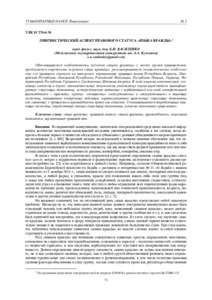Please use this identifier to cite or link to this item:
https://elib.psu.by/handle/123456789/24557| Title: | Лингвистический аспект правового статуса «языка вражды» |
| Authors: | Василенко, Е. Н. Vasilenko, E. |
| Other Titles: | Linguistic Aspect of the Legal Status of Hate Speech |
| Issue Date: | 2020 |
| Publisher: | Полоцкий государственный университет |
| Citation: | Василенко, Е. Н. Лингвистический аспект правового статуса «языка вражды» / Е. Н. Василенко // Вестник Полоцкого государственного университета. Серия A, Гуманитарные науки. - 2020. - № 2. - С. 71-76. |
| Abstract: | Обосновывается необходимость изучения «языка вражды» с точки зрения правоведения, предлагается определение термина «язык вражды», рассматриваются лингвистические особенности его правового статуса на материале нормативных правовых актов Республики Беларусь, Латвийской Республики, Литовской Республики, Российской Федерации, Республики Польша, Украины, Федеративной Республики Германия и Соединенных Штатов Америки. В ходе анализа конституций, уголовных кодексов и других законодательных документов упомянутых стран выделяются квалифицирующие смысловые доминанты, непосредственно связанные с вербализацией или иной манифестацией враждебности – «вражда», «рознь», «ненависть», «нетерпимость» и «дискриминация», и языковые элементы, называющие конкретные действия, характеризующие выделенные смысловые доминанты или связанные с проявлением враждебности прямо или косвенно. Устанавливаются атрибутивные языковые элементы, определяющие данные смысловые доминанты, а также доминанту «равенство».= The article substantiates the need to study hate speech from the point of view of jurisprudence, proposes a definition of the term “hate speech”, discusses the linguistic features of its legal status based on the material of the legal acts of the Republic of Belarus, the Republic of Latvia, the Republic of Lithuania, the Russian Federation, the Republic of Poland, Ukraine, the Federal Republic of Germany and the United States of America. Qualifying semantic dominants directly related to verbalization or another kind of manifestation of hostility are identified based on the analysis of the constitutions, criminal codes and other legislative documents of the aforementioned countries. Language elements describing concrete actions that characterize the selected semantic dominants or are directly or indirectly related to the manifestation of hostility are singled out. The attributive linguistic elements that define the given semantic dominants are determined. |
| Keywords: | Государственный рубрикатор НТИ - ВИНИТИ::ОБЩЕСТВЕННЫЕ НАУКИ::Языкознание «Язык вражды» Правовой статус «языка вражды» Враждебность Смысловая доминанта Нормативный правовой акт hate speech Legal status of hate speech Hostility Semantic dominant Legal act |
| URI: | https://elib.psu.by/handle/123456789/24557 |
| metadata.dc.rights: | open access |
| Appears in Collections: | 2020, № 2 |
Items in DSpace are protected by copyright, with all rights reserved, unless otherwise indicated.
